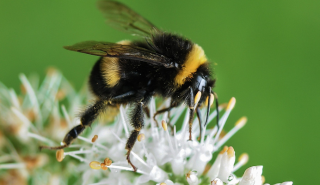Bumble bees are still being harmed by pesticides: study
29 November 2023

A large five-year European-wide research project, led by academics at Royal Holloway, University of London, has confirmed that commonly used pesticides in agriculture are still significantly harming bumble bees, with colonies growing less and producing fewer offspring.
The report is from a pan-European project called PoshBee, led by Professor Mark Brown from the Department of Biological Sciences at Royal Holloway. It comes at a crucial time when the European Parliament recently voted against reducing pesticide use, as part of its Green Deal climate law aimed at cutting greenhouse gas emissions within the EU by 55% by 2030.
This study was conducted in 106 sites across eight European countries, with fieldwork in the UK led by Dr Deepa Senapathi and Professor Simon Potts from the University of Reading. It shows that, despite tightened pesticide regulations, there is much to be done to support the health of bumble bees in the wild.
The findings, published in the journal Nature, reveal that, despite the world's most rigorous risk assessment process, the use of approved pesticides in European agricultural landscapes, including the UK, still negatively affects non-target organisms, such as bees. This significantly reduces the colony performance of bumble bees: a key wild and commercial pollinator.
The report supports the need for sustainability goals to reduce pesticide use and risk – critical challenges highlighted at the Convention on Biological Diversity’s COP 15 meeting and a vital part of the European Farm to Fork strategy – with anticipated benefit to bees and, potentially, their pollination services.
Professor Mark Brown from Royal Holloway said: “With COP28 soon upon us, our research highlights there is still much work to be done in terms of mitigating the effects of approved pesticides on pollinators, not just in the UK, but across Europe.
“The scale of this work provides a step-change in our understanding of the impact of agrochemicals on pollinator health, but we need to act now. A strong, and governmentally supported move towards integrated pest management in agricultural systems across the globe, resulting in a reduction in pesticide use, would dramatically improve the health of wild pollinators, and broader biodiversity.
“Bumble bees, and other animals, do not recognise international borders, and to protect them, we need to take a similarly international approach, to make sure their pollinating colonies survive, nature thrives and in turn, so does the food chain we all rely on.”

